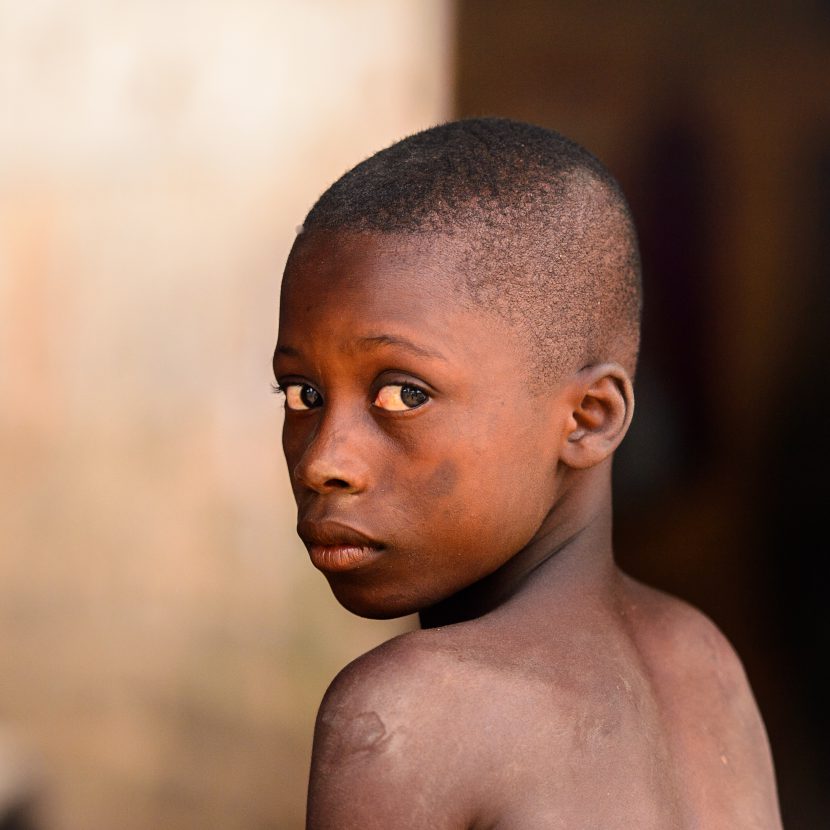In Ivory Coast, disabled children are especially vulnerable. Neglected by the state and relegated to the fringes of the community, their right to an education is completely disregarded.
Definition of Disabled
The World Health Organization states:
‘The International Classification of Functioning, Disability and Health (ICF) defines disability as an umbrella term for impairments, activity limitations and participation restrictions.’ http://www.who.int/mediacentre/factsheets/fs352/en/
In Ivory Coast, disability is seen as a sort of curse. This manifests in the widespread usage of such cruel names as ‘snake child’, ‘child witch’ or ‘child of unhappiness’. It hardly needs saying that these children suffer shocking discrimination throughout Ivory Coast society.
In Ivory Coast, it is possible to live in close proximity to a disabled child and to be quite unaware of his or her existence.
Disability is taboo, a vexing, upsetting subject. According to traditional societal ideas, having a disabled child is almost considered a curse.
In rural areas, there are rites for ‘removing’ these ‘children of unhappiness’, as the ‘normal’ children require all the limited means these families dispose of. Some parents, fearing public reactions, hide their children at home without ever showing them to the outside world.
Others find the courage to take them out in public, but not without difficulty. They are inevitably followed by stares, expressions of contempt, untoward comments and unseemly questions.
Widespread and considerable ignorance about disability
There is a significant lack of information about disability in Ivory Coast. Disabled children are rejected, very often, simply out of ignorance. They appear different and strange and there is a misperception that they could infect others.
For the very superstitious, a disabled child is often the result of its parents ‘mystical’ behaviour and practices. In fact, everyone gives their own interpretation and the real causes of disability are little known or understood.
Worse, sometimes the parents of disabled children do not know that their child has a disability. This is especially the case for intellectually disabled children. Whatever their disability, they are all placed in the ‘dumb-dumb’ category, in other words, classed as ‘abnormal’.
With good reason, in the public hospitals, few doctors take the time to explain to the parents the causes behind the disability and the effects the disability will have on the child’s development. It falls to the parents to do their own research to find out more, by gathering information here and there, mainly on the Internet. However, with the illiteracy rate in Ivory Coast being 51 percent (UNESCO, 2013), this option is taken up by very few parents.
There is help – but not enough
There are two establishments for disabled children in Ivory Coast: INIPA (the National Institute for the Blind) and ECIS (a school for the hearing-impaired). Both were founded in 1974. That means that for more than 40 years matters have been state-run. Moreover, these establishments only cater to disabled children having one of their senses impaired. For intellectually disabled children, there are some private initiatives, but the state does not intervene at all.
There are some private initiatives for taking care of disabled children, to ease the parents’ financial burden.
In addition, there are centres that cater to disabled children, for example the White Page, The Association for Rehabilitation of the Children Education Adapted. With a team comprising of specialist educators, pre-school teachers, a physiotherapist and many other professionals, they undertake to educate children who have cerebral palsy, autism and other afflictions. However, their capacity is very limited.
The Authorities are Taking Note
The Ivory Coast government is beginning to consider education for all children, thanks to the project ‘Inclusive School’ in terms of primary education. This is an initiative of the Ministry in charge of Social Services.
The project brings together in the same class ‘normal’ children and disabled children, all of whom receive the same education from the same teacher. Although still at the experimental phase, the project seems to be running smoothly and successfully.
There remains much to be done for disabled children in Ivory Coast. A general consciousness-raising about disabilities is essential if the discrimination is to end. This will allow disability to be de-stigmatised and will promote better integration of disabled children into Ivorian society.
Some sources
http://www.scidev.net/afrique-sub-saharienne/education/actualites/l-ducation-inclusive-solution-l-insertion-des-enfants-handicap-s.html (in French)
http://www.adry.up.ac.za/index.php/2013-1-section-b-country-reports/cote-d-ivoire (in French)
https://www.info-afrique.com/8552-lecole-pour-tous-une-realite-en-cote-divoire/ (in French)
http://en.handiplanet-echanges.info/organisations/the-white-page?set_language=en
http://childrenofafrica.org/en/action/support-disabled-people//
Written by: Estelle Ahoua
Translated by: Bronwen Claire Ewens into English
Proofread by: Denis Gingras


